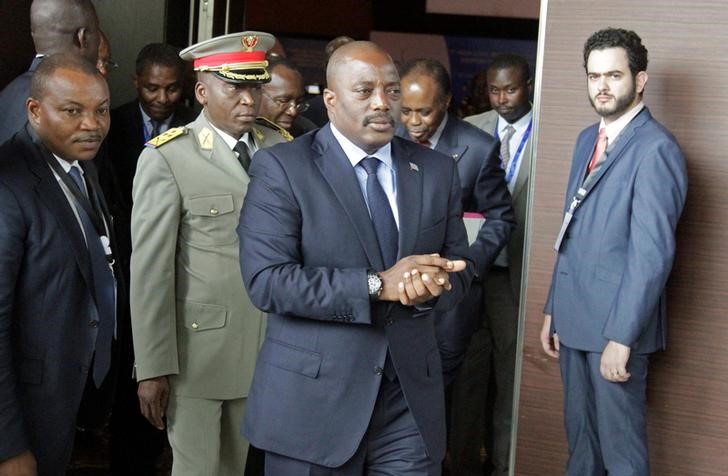By Aaron Ross and Robin Emmott
KINSHASA/BRUSSELS (Reuters) - The United States on Monday imposed sanctions on members of Joseph Kabila's inner circle for the first time, a week before the Congolese president's mandate expires, to try to force the government to agree a compromise with opposition leaders.
Earlier on Monday, the European Union imposed travel bans and asset freezes - its first - on seven security officials it says have violated human rights and helped disrupt elections.
International powers fear that Kabila's refusal to leave power on Dec. 19, as required by the constitution, could lead to widespread violence after anti-government protests in September, in which about 50 people were killed by security forces.
The U.S. sanctions place interior minister Evariste Boshab and the head of the country's intelligence service (ANR), Kalev Mutondo, on a list of "specially designated nationals".
"The Congolese government continues to undermine democratic processes in the DRC and repress the political rights and freedoms of the Congolese people," Adam Szubin, Acting Under Secretary for Terrorism and Financial Intelligence at the U.S. Treasury Department, said in a statement.
Democratic Republic of Congo's (DRC) government was not immediately available for comment. It has previously denied Kabila is trying to violate the constitution.
The United States has already placed three Congolese generals on its sanctions list this year but Boshab and Mutondo are the highest-level targets yet.
Boshab, who oversees the police, was previously the secretary-general of Kabila's ruling political party and Kalev is considered by rights groups to be the mastermind behind a crackdown over the past year on opposition and activist groups.
Any financial assets they have in the United States are blocked and Americans are generally barred from engaging in financial transactions with them.
The EU imposed sanctions for the first time, listing Commander of the Republican Guard, Ilunga Kampete, and six others, including Kinshasa's police commissioner and intelligence officials.
"Additional restrictive measures may be considered in the event of further violence or the political process being impeded," the EU said in a statement.
The government says that the election to select Kabila's successor, originally scheduled for last month, cannot be organised until April 2018 because of the need to register millions of new voters.
Kabila has vowed to stay on until the presidential vote despite being banned from seeking another term after being in power since 2001, but the opposition accuse him of manipulating the process to cling to power and has vowed protests on Dec. 19.
Millions died in two regional conflicts in the vast central African nation between 1996 and 2003, and DRC has never experienced a peaceful transition of power.

The tough line from the United States and the EU is also an attempt to arrest a broader trend among regional leaders clinging to power, after heads of state in Congo Republic and Rwanda changed their constitutions to stand for third terms.